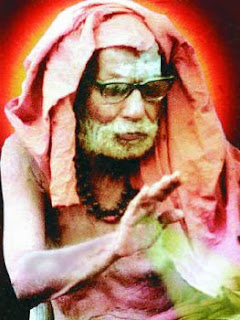In the early hours of the morning before the sun rose, Srinivasan lit a small ghee lamp and incense and placed it next to the box. His heart beat fast as he slowly opened it. Within it lay a few items of puja, a yellow cloth and in its center in a cloth bed lay a piece of bamboo. It was smeared in turmeric and had a lot of threads rolled around it. He picked it up carefully and laid it on the floor. He whispered a prayer to himself and bowed to it, holding both the corners. Srinivasan was surprized as he had never felt this before. His arms shook as they could not withstand the energy that flowed through them. He was unable to hold the bamboo, as his arms trembled. With humility he raised himself up again and placed the piece of bamboo back into the box.
Srinivasan looked up to the Lord seated within the chamber of his little throne. He wondered what spiritualism was, what the energy of the Lord was and who he was as a drop of atman floating in this consciousness in this universe at this time in this space. He closed his eyes and a mantra of the three eyed Shiva flowed into his mind. He looked up at the slab of vilva wood that lay within the chamber. He had heard a story about it.
There was a saint who walked the earth in these times and touched the souls of everyone with his humility. It was one morning at his ashram that he walked up to a vilva tree and sat under it. In a while the tree descended to lie next to him. He spent hours with the tree in divine conversation, unmoved, unshaken and in complete deep thought. After a long time, he turned and asked his pupil to get a peice of bamboo shaped as an axe. The dying tree was cut, and each part of its trunk was made into a slap and given to his disciples with instructions to give it to anyone worthy of it.

Srinivasan looked back at the spiritual journey he had made in his life. He meditated over these simple things that had far more value than gold. He revered his Guru, the symbolism of whose he worshiped before he started his prayers to the Supreme. He had heard great stories about the Mahatma, of his appearance well after he had left his earthly self. He had revisited his disciples, and instructed them about their activities. He had blessed them and disappeared. All they ever saw was the sacred Dandam (staff) that represented the great Shankaras stand in front of them held by a hand mid air in space.
 This was the great emblem of the Shankaras, a bamboo staff that was so simple to look at but so sacred that its energy could be felt within the mind when it was clean and immersed in divine love for the Guru. It was the staff of enlightenment that represented the ending symbol of every mantra written. It was the staff of knowledge that represented the supreme guru who is the solution to our earthly presence and our learning about quality life.
This was the great emblem of the Shankaras, a bamboo staff that was so simple to look at but so sacred that its energy could be felt within the mind when it was clean and immersed in divine love for the Guru. It was the staff of enlightenment that represented the ending symbol of every mantra written. It was the staff of knowledge that represented the supreme guru who is the solution to our earthly presence and our learning about quality life.The great staff, is what we limited human beings are able to see because this is the only visible symbolism of the other world, the celestial world and the empowering knowledge that it comes with feeding our thoughts with divine wisdom. This is the dandam of the Shankaracharya. This is the emblem of wisdom and this is the power of learning that we lesser mortals need to worship. The truth is, the Lord is not out there, but he is in here within us and the noise of our worldly problems is the Maya that bars us from listening to his silence.
He awakens the other world, that which is fed by words and sustained by imagination, that which is invisible and needs to be sort after, that which speaks in silence and disappears in noise, that which is felt with emotion and logic, that which has rules that are never broken, that which always was and never changed, that which springs from deep rooted energy that gives us life, that which neither you nor I have ever cared to understand.
Srinivasan thought to himself, as he stood at the gates of his own divine world of imagination like a gatekeeper who guarded because he believed but didnt really know what was inside. He felt like a blessed ignorant fool, holding a diamond in his hand and not believing so because it didnt shine!
Tears rolled down his eyes as he stared on at the divine, he felt miserable that this was he, and he felt happy that at least he had come this far and now this was he. He felt the dualism in his existence, he felt the incompleteness in his form, he felt the inprisonment in his flesh and he experienced the dumb ignorance within his mind. This was he, this is he and hopefully will not continue to be him.
